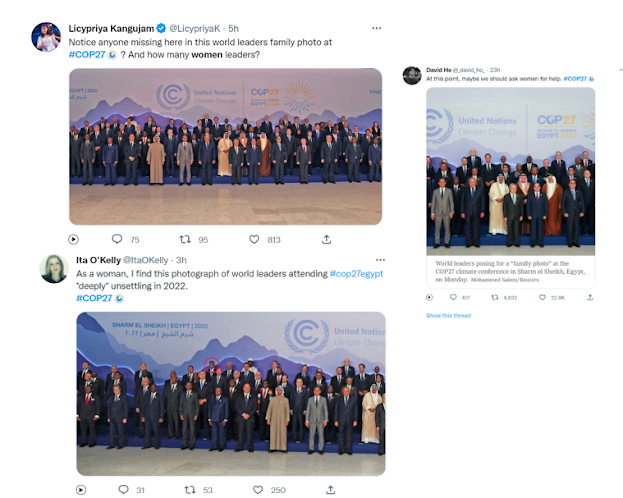Throughout this series of blogs, it has become
clear that there is a need to involve women in water management policy arenas.
Climate change will induce changes in the water cycle which will have
gendered-implications in Africa. Despite the evident need for the involvement
of women in policy making, there is a lack of female participation in both
local scale (see blog 3) and global scale discussions. As world leaders
gathered in Egypt for the COP27 summit, Twitter users remarked on the absence
of women at the negotiations.
Despite the recognition of issues at play,
progress in women’s participation has been painstakingly slow, and has even
been making backward progress since 2018, as is shown in Figure 2. Analysis by
the BBC found that less than 34% of country negotiation staff at COP27 were
female, and some teams were more than 90% male (BBC 2022).
Figure 2: A graph showing historical rates of participation of women in country delegations at Climate Change Conferences (source: BBC 2022)
In addition to commitments to gender equality in negotiations, many recent COP events have included a thematic ‘gender day’. The promotional video for this year’s COP27 gender day can be seen below.
The promotional video focusses on describing
the plight of impoverished women, rather than presenting them as empowered
agents of change. As such, we might interpret this video and the ‘gender day’
to be promoting the same infantilising narratives Wainaina reflected on in his
piece ‘How to Write About Africa’ that ultimately amount to a post-colonial
‘victimisation fallacy’ which present African woman in particular as victims
who must be saved (Wainaina 2019 ; Frohlich and Gioli 2015: 145).
However, women’s oppression and vulnerability
to climate change becomes their strength in the context of climate change
policy discussions. African women’s traditional economic and social roles, such
as water collection mean that they develop a relationship with local ecologies
and therefore are entwined with the ecological changes associated with climate
change (Steady 2014: 313). As a result, women are bound
to develop a strong understanding of the environmental changes that take place
locally. In addition to this, understanding the ways women are vulnerable to
the implications of climate change (as I explored in my previous blog) can mean
that appropriate mitigation strategies are established.
From this, it becomes clear that integrating
gender-perspectives into climate reduction policies is essential to mitigating
climate change, and moving forward women must be present and empowered to
contribute at climate change conferences. Perhaps the legally-enforced
gender-quotas that were implemented at local scale in Malawi (see blog post 3)
would be a useful means to driving gender-equitable participation at global
climate change conferences.


Great blog ! some really interesting ideas of how these talks could just be resenting women as vulnerable instead of empowered and leaders in climate change mitigation. you mentioned that participation has been slow and even making backwards progress ! I was wondering why you think this could be? furthermore how do you think that women could be resented as empowered at these talks rather than vulnerable?
ReplyDeleteThank you for your comment! I think the issue of women's participation at climate change conferences is part of a broader issue of gender inequality in many facets of life. For much of history women's traditional roles confined them to domestic work and it is only in around the last century that we have seen advances in women's rights, empowerment and participation. A lot of work will need to be done to dismantle the longstanding systemic barriers to women. As for the second element of this question, this is not necessarily something I have considered but it is a logical conclusion to come to! For some men, women's empowerment might pose a threat to their established sense of authority and power, so this might discourage men in power from prioritising women's participation. I think it is unlikely that male politicians would ever admit to this however it is definitely interesting to consider the implications personal biases like these might have on progress in women's participation.
DeleteAn interesting read and a good insight to the summit in 2022. Do you think enough was done to increase participation at COP27? What are your thoughts on this?
ReplyDeleteThanks for your comment Arber! Given that the conference was overwhelmingly male, I do not think enough was done to encourage women's participation. I think that much of the action that was taken to increase women's participation was seemingly superficial, such as celebrating gender day to 'increase women's participation', without actually establishing gender quotas. That being said, I appreciate that women's participation is part of a broader issue and is not confined to climate change conferences, for example the Twitter images show world leaders, not just climate delegations, this demonstrates the barriers women face to participation in politics at the highest level and this will require country specific responses to address the systemic barriers to participation women face.
Delete